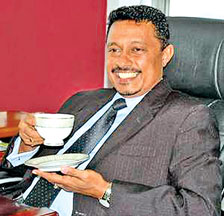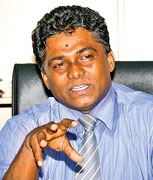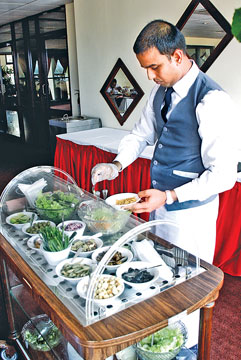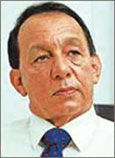TRAVEL
EDB to launch five-year strategic plan
by Surekha GALAGODA
The Export Development Board (EDB) will launch a strategic plan for
five years from 2010-2014, said Chairman EDB, Janaka Ratnayaka.
 |
|
Janaka Ratnayaka |
He said the main aim of the strategic plan is to enhance exports to
reach 20 percent of the GDP. Ratnayaka said that they have already
identified six sectors with high potential and large markets which
include apparel, tea, rubber, gems and jewellery, ICT, food and
beverage. Another seven sectors with high potential but with small
market shares too have been identified which includes fish and fishery,
coconut products, electrical and electronic items, petroleum products,
printing, boat building, as well as professional services.
Ratnayaka said that EDB is also planning to launch international
marketing and communication campaigns to popularise our exports.
In addition we are planning to have the EXPO exhibition in November
next year.
He said that the government is planning to increase the export
revenue to reach $ 20 billion by 2020 while at present it is $8 billion.
EDB is targeting to reach an export revenue of $ 15 billion by 2015.
Clarifying the position of recent news item on reptile exports
Ratnayaka said that a delegation from the Pet Association of Germany
visited Sri Lanka and during discussion one importer said that Sri Lanka
has the potential to export reptiles as they can be bred due to the
conducive climatic conditions in the country. He said that there are
reptile farms around the globe while anti serum is also imported by Sri
Lanka.
He said that EDB only facilitates exporters and does not get involved
in exports.
French unions to extend strikes
RuadhN MacCORMAIC in Paris French unions voted yesterday to extend
their strikes over the government's pension reform plans, with trains
disrupted and blockades halting fuel transport from eight of 12
refineries.
However, a day after nationwide protests attracted the largest crowds
so far in the unions campaign, President Nicolas Sarkozy said he would
push the reform right to the end.
Irrespective of the difficulties in putting in place such a major
reform, the government must, in the common interest, continue with
determination and sang froid, spokesman Luc Chatel quoted Mr Sarkozy
telling yesterday's Cabinet meeting.
The pensions Bill is currently being debated in the upper house,
where two of its most contentious elements a rise in the minimum
retirement age from 60 to 62 and in the age at which one can receive a
full State pension from 65 to 67 have already been approved.
However, after three days of strikes and protests in the past month,
unions have this week escalated their campaign with a series of daily
votes on rolling strikes.
Organisers estimated that some 3.5 million people took to the streets
across France on Tuesday for the fourth day of protest in a month. The
police put the turnout at 1.2 million.
The Paris metro and regional train network were affected by mild
disruptions yesterday, while the State railway company SNCF said a
quarter of staff stopped working.
The powerful CGT union said yesterday that of the half of its local
sections which had voted on extending the strike to today, all had
agreed to the prolongation.
Ministers acknowledged that the unions campaign did not appear to be
ebbing but refused to back down on the reforms.
I'm not denying there were a lot of people in the streets but at the
same time what can we do not reform the pension system, Labour Minister
Eric Woerth told RTL radio.
With workers having halted the transport of fuel from eight of
France's 12 refineries yesterday, oil industry groups warned that French
petrol stations could begin to run low by next week.
Television reported some people in southern France were starting to
hoard fuel.
Union leaders, buoyed by Tuesdays turnout, have called another march
for Saturday, and warned that the strikes may continue.
If we get past the weekend we will not stop, said Bruno Duchemin,
General Secretary of the FGAAC-CFDT rail worker's union.
The escalating dispute has added to tensions between the government
and the opposition Socialist Party, which has supported the protesters.
Ministers yesterday described as shocking and deeply irresponsible a
call from a prominent socialist S‚golŠne Royal for young people whose
involvement in greater numbers on Tuesday swelled the turnout to descend
on the street.
I find it extremely shocking that a political figure like Madame
Royal is calling for secondary school pupils to skip school, said Higher
Education Minister Val‚rie P‚cresse.
ICTA wins awards for best ICT projects in the world
Three innovative ICT projects under the e-Sri Lanka initiative
created history at Asia's FutureGov 2010 event in Malaysia recently.
ICTA set a new record when it won three awards for its Government ICT
innovative projects at the awards presentation held at Kota Kinabalu in
Malaysia.
Judged by a seven-member committee of senior officials and
technologists chaired by FutureGov Asia Managing Director James Smith,
the Lanka Gate Project made ICTA the Public Sector Organisation of the
Year among SAARC countries.
The award recognises the administrative excellence of the Sri Lankan
Government in the SAARC region.
Rising above the regional category as the leader out of SAARC
comprising India, Bangladesh Afghanistan, Bhutan, the Maldives, Nepal
and Pakistan, ICTA also made its mark in two subject categories. While
the Sri Lanka Gov SMS Portal won for ICTA the Asia Pacific award under
the Service Innovation category, ICTA's Nenasala Project, the brainchild
of President Mahinda Rajapaksa bagged the award under the Digital
Inclusion category.
"The Nenasala Project secured the award due to its excellence in the
use of technology to bridge the digital divide, The award given in
consideration of the Lanka Gov SMS Portal recognises the excellence of
innovation in the Sri Lanka Government's service to the people, "
Chairman ICTA, Professor P.W. Epasinghe said.
For this fourth annual Asia Pacific government technology awards
event held under 22 categories parallel to the FutureGov Summit there
were 869 nominations from 16 countries compared with about 620
nominations last year. "It is significant that ICTA and the Ministry of
Public Administration and Security of Korea are the only two
organisations that have won the highest number of awards at the
FutureGov 2010," Chief Operating Officer ICTA Reshan Dewapura said.
"It is noteworthy that ICTA has set this record of winning three
awards amidst countries of the Oceania category including Australia and
New Zealand, countries of the Middle East category like Egypt, North
Asian countries like China and Japan and countries of the Association of
South East Asian Nations," he said.
Referring to the awards that have made ICTA set new records, Dewapura
said that winning awards has not been new to Sri Lanka.
However the reason behind the great strides in the ICT sector that
are being made is the concept contained in the Mahinda Chintana and its
extended version the Mahinda Chintana - Vision for the Future, the
policy statement of the Government.
Dankotuwa completes quality week
Under the theme "Productivity and Quality through continued
improvement" Dankotuwa launched several employee focused activities to
coincide with National Quality Week, October 11-17.
The program commenced with the Chairman addressing the workforce of
1,000 employees urging them to be passionate about quality.
It was the quality and service standards of the company that enabled
it to survive during the global recession when many international giants
in the industry got into serious difficulty as a result of the drop in
demand. The Quality flag was unfurled by the most senior factory worker.
Competitions for posters, slogans, essays, poems, cartoons and
nisadas on the Quality Week theme were organised. Poster, slogan and
cartoon entries were judged by popular cartoonist Winnie Hettigoda. A
competition on posters, essays and poems for children of employees in
two categories - A/L and O/L and below, a guest lecture on leadership as
well as a quiz program were held to promote 5S implementation in homes
of employees based on the 'Sonduru Nivasa' program launched by the
National Productivity Secretariat. Videos of model schools which have
implemented 5S were shown to groups of children in nearby schools.
SLITHM gears to meet manpower needs in tourist industry
by Surekha GALAGODA
The Sri Lanka Institute of Tourism and Hotel Management (SLITHM) will
launch a course on authentic Sri Lankan cookery for the younger
generation by Dr. Pubilis next month.
 |
|
Dr. Suranga Silva |
The course will create an awareness of authentic Sri Lankan cookery
said SLITHM Director General and CEO, Dr. D.A.C. Suranga Silva.
He said that though hotels have ‘Sri Lankan corners’ the taste of
each curry differs from hotel to hotel which confues guests.
“Therefore we decided to get the services of the expert in authentic
Sri Lankan cookery teach the younger generation”.
SLITHM has provincial colleges in Koggala, Bandarawela, Kandy,
Anuradhapura and Ratnapura.
At present Ratnapura has courses upto certificate level while plans
are afoot to start all courses soon.
He said that SLITHM is planning to introduce more cookery courses to
cater to the requirements of customers.
SLITHM is also in the process of training therapists working at
Ayurveda spas together with the Ayurveda Faculty of the University of
Colombo. Once they complete the course of six months duration, we will
give them a certificate which will help them get jobs.
The course will be announced soon.
SLITHM together with SriLankan Airlines will launch a course on
Airline ticketing to cater to the needs of the hospitality industry.
SLITHM also conducts courses on foreign languages including French,
German and Japanese while the Chinese language course is to be launched
in collaboration with a foreign university.
The Japanese course was a collaboration with the University of
Colombo.
 |
|
Kitchen Pic: Kavinda
Perera |
Speaking of future plans he said that SLITHM is gearing to cater to
the requirements in the tourism industry which is planning to attract
2.5m tourists by 2016.
According to plans at least one job should be generated for 4-5
tourists.
Therefore 600,000 jobs should be generated to cater to the future
needs of the industry.
He said that 1.75 percent labour input is needed to service one room
while it incases to three persons if the hotel is cottage type.
Therefore the hotel industry alone will need close to 100,000 by
2016.
Dr. Silva said that the universities and the private sector should
get ready now to cater to the manpower training needs of the country.
Tourists want good accommodation and they should be welcomed with an
euphoric attitude.
Among the plans to be implemented are grading of guides according to
qualifications, experience and mannerism; a six month course for
national tour guides and issuance of licences at the end of the course.
A four month course for chauffeur guides where a chauffeur guide
licence will be issued.
Dr. Silva said that SLITHM alone cannot fulfil the manpower
requirements of the industry, therefore the support and cooperation of
the private sector is needed.
SLITHAM together with the private sector has drawn plans which
include-private sector in house on the job training, increasing the
number of batches trained per year, franchising the programs under the
guidance of SLITHM (where the syllabus and the exams will be conducted
by SLITHM) accrediting private hotel schools also to conduct the SLITHM
courses and m-learning which will be used to increase the trained
manpower needs of the country.
Some of the challenges faced by the industry are people engaged in
the industry leaving for greener pastures and the shortage of good
lecturers.He said the challenge of people leaving Sri Lanka will be used
as an opportunity to earn foreign exchange.
Dr. Silva said that Sri Lanka doesn’t need to import labour from
neighbouring countries to cater to the future demand in the industry as
we are confident that we can face the challenge.
Marked increase in visitors from American continent- Chairman
SriLankan
by Sapumali GALAGODA
Visitors to Sri Lanka from USA and Canada have increased by 25.2
percent and 21.1 percent in the first three quarters of 2010 compared to
the same period in 2009. Several agents are now keen to show Sri Lanka’s
long denied attractions to leisure seekers and the country’s renewed
appeal to ethnic travellers, said Chairman Sri Lankan Airlines,
Nishantha Wickremasinghe at a press conference in Colombo last week.
 |
|
Nishantha
Wickremasinghe |
For the first time in decades nine tour operators from North America
and Canada visited Sri Lanka on a tour organised by United Holidays.
There is no better time to invest in the North American region and
Sri Lankan airlines is set to expand its business in several areas
including the purchase of new aircraft, introduction of new destinations
increased frequencies and the commencement of air taxi operations said
Wickremasinghe.
He said that Sri Lanka is being recognised as a new destination in a
recent article in the New York Times which listed Sri Lanka as first
among the 31 Top Destinations to Travel in 2010.
The National Geographic ranked Sri Lanka second among its Top 25
places to visit in 2010 these endorsements among others have renewed
interest in the leisure segments in USA and Canada which are constantly
seeking new, unique and exotic places to visit. The tour operators said
they were amazed by the diversity the country offered and said that the
people in this country make the destination incredible.
The operators said that English is very important to really push Sri
Lanka ahead in tourism and it is spoken very well in Sri Lanka which
makes communication easy.
Awareness is needed to explain the richness and the diversity while
the destination if not at the top will get there sooner than later.
An operator Ashok said “the experience is amazing.
It is a long way to get to Sri Lanka but it is well worth it and this
time we just scratched the surface”.
Ms carol of East West Tours USA specialising in Asia , said “it is a
fabulous new market for us but one week is not sufficient to enjoy Sri
Lanka.
SpiceJet flies to Colombo
by Sapumali GALAGODA
SpiceJet India’s low cost carrier made its first flight to Colombo
last week strengthening air connectivity between India and Sri Lanka.
SpiceJet will operate daily flights between Colombo and Chennai which
will further be connected to other important places within the domestic
network of SpiceJet.
The airline will fly its new generation Boeing 737-800 aircraft and
189 seats are available.
Fares offered by SpiceJet on this route are among the most
competitive in the industry, said CEO and Director Kishore Gupta.
“Sri Lanka is a diverse and culturally rich country with a strong
history as a trading society. By making travel to Colombo less expensive
and hassle free we are confident that this route will become very
popular. The initial response to the launch of these flights is
encouraging and will rapidly establish our presence in the Sri Lankan
market and at the same time strengthen air connectivity to destinations
within the SAARC region”, said Gupta. SpiceJet plans to expand its
network over the next few months to Bangladesh and the Maldives.
|

